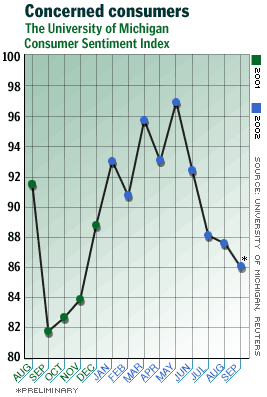NEW YORK (CNN/Money) - A closely watched measure of consumer confidence in the United States in January was revised downward, a published report said Friday, coming in weaker than analysts had expected.
The University of Michigan's consumer sentiment index was revised to 82.4 from an initial reading of 83.7, according to a Reuters report. Economists, on average, expected a reading of 83.5 following December's reading of 86.7, according to Briefing.com.

"It was weaker than expected, but it wasn't a dramatic surprise," said UBS Warburg economist Jim O'Sullivan. "It was already pretty clear that sentiment came off in January."
The university's expectations index, which measures how consumers think the economy will perform in the near future, dropped to 72.8 from 80.8 in December, according to the report. The current conditions index rose to 97.2 from 96 in December, Reuters said.
The report had little impact on U.S. stock prices, which were mixed in early trade. Treasury bond prices fell.
Consumer spending is closely watched by Wall Street and economists since it fuels more than two-thirds of the total U.S. economy.
Consumer spending has been remarkably resilient despite the recession that began in March 2001, nearly 1.8 million job cuts, the Sept. 11 attacks, a wave of corporate accounting scandals, and falling stock prices.
But persistent labor-market weakness and concerns about a possible war in Iraq have weighed on consumer confidence, if not their spending.
Earlier this week, the Conference Board said its closely watched consumer confidence index fell to a nine-year low in January. The components of that index mirrored the actions of the Michigan index components, with confidence about current conditions rising, but fears about the future growing.
Nonetheless, the Commerce Department reported Friday personal income rose 0.4 percent in December and personal spending rose 0.9 percent, beating expectations -- consumers seem to be spending, no matter how worried they are.
"Household spending is staying pretty resilient," O'Sullivan said.

|

